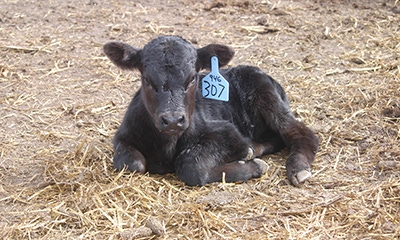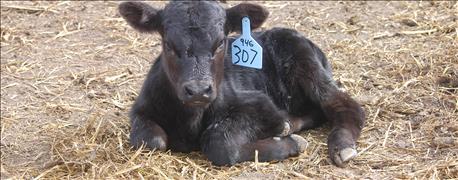January 12, 2016

This calving season, consider giving cows pre-calving vaccinations to help control scours in calves, suggests Taylor Grussing, South Dakota State University Extension cow/calf field specialist.
The vaccinations can the boost the quality of the cow's "first milk" or colostrum, which will help protect the calf from scours. The vaccinations stimulate production of antibodies in the mother's body, which are then directed towards the mammary gland when she begins producing colostrum. . These antibodies are then passively delivered to the newborn calf through its first drink of colostrum, providing a first line of immunity within hours after birth.

This little calf needs all the protection he can get from scours.
"In order for this type of vaccination to be effective in transmitting protection to the newborn calf, it must be delivered to the pregnant female at the correct dose, and within an appropriate window of time," Grussing said.
Pregnant females begin to form colostrum by pulling antibodies from the blood and storing them in the mammary tissue three to five weeks before calving.
"This process continues until birth," Grussing says. "Therefore, performing booster vaccinations six to seven weeks prior to the expected calving date may not be effective in aiding high quality colostrum production or in preventing calf scours."
Depending on the age of the cow and type of product used, Grussing added that there are different requirements which need to be followed. For example, heifers require an initial vaccination followed by a booster at least three weeks later (follow label recommendations), whereas cows that have been vaccinated in previous years only require an annual booster.
Grussing encourages cattle producers to always consult with their herd veterinarian for assistance in developing a pre-calving vaccination program specific to their cow herd needs.
Source: SDSU Extension
You May Also Like




